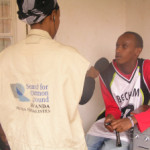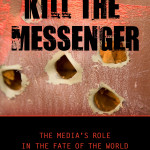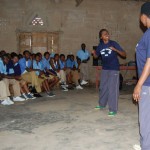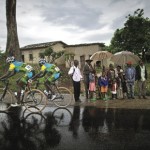The Common Ground Blog is an initiative of (Search for Common Ground), an international non-governmental organization (NGO), headquartered in Washington and Brussels, whose mission is to transform the way the world deals with conflict - away from adversarial confrontation towards cooperative solutions. (more info)
Two men, fifteen scars–one act of forgiveness
By Jean Baptiste Ndabananiye & Julia Boccagno
Physical and mental scars can’t be erased; they serve as constant, unforgettable reminders of the past. Yet, with the correct tools and resources, even the worst scars eventually fade.
Our team in Rwanda attempts to do just that—heal the emotional and psychological scars of genocide survivors through reconciliation programs.
For Gakwerere Innocent, a genocide survivor, sincere and genuine forgiveness was never an option. After being slashed with a machete 15 times and having 36 family members killed, Innocent craved revenge towards those who inflicted this unbearable pain.
As for Wellars Uwihoreye, a genocide perpetrator, he was one among many instructed to hunt and murder Innocent. “It’s thanks to God that I didn’t kill him since I was hunting him,” he said. He’d given up hope of ever being forgiven for committing these inhumane crimes.
That all changed.
Because of the USAID funded program “Maximizing the Impact of Reconciliation in Rwanda,” Search’s radio journalists launched “Success Stories on Reconciliation in Rwanda,” a media initiative that publicly broadcasts personal stories of internal conflict resolution. The subjects of the stories become role models, inspiring both victims and perpetrators of genocide to embark on the challenging and rewarding journey to forgiveness.
The program allowed Gakwerere Innocent and Wellars Uwihoreye to peacefully reunite. With additional help from the nonprofit Christian Action for Reconciliation and Social Assistance (CARESA), Innocent was greatly moved by Uwihoreye’s plea of forgiveness. Innocent explained, “Uwihoreye asked me for forgiveness from the bottom of the heart so that I felt really fully satisfied to forgive him. He knelt before me and beseeched me pardon; he did it in a spirit of deep sincerity and conviction with deep feeling.”
Uwihoreye was awed and speechless by Innocent’s graciousness, “It was like a dream when I heard Innocent forgive me because I wouldn’t imagine because of cruelty I had committed against him, I immediately saw him like God.”
Now, Innocent and Uwihoreye are not only close friends, but their wives also confide in one another. Innocent and Uwihoreye even share a cow as part of an initiative known as “Cows for Peace,” which strives to build sustainable socioeconomic relationships among its clients through the joint ownership of a farm animal.
To forgive is not to forget. The horrific mental, physical and emotional scars caused by the 1994 genocide will always remain a part of Rwanda’s history. However, thanks to grassroots reconciliation programs, scars of the past can be lessened and healed to restore unity among the people.
Please share their story.
_______________________________________
As one of Search’s radio journalists, Jean Baptiste Ndabananiye, helped produce content for Success stories on Reconciliation in Rwanda as part of “Maximizing the Impact of Reconciliation in Rwanda.”
As a rising American University junior, Julia Boccagno majors in Broadcast Journalism and double-minors in International Studies and Italian with the hopes of becoming a future foreign correspondent. She firmly believes that objective news reporting is a vital tool within the peace and conflict resolution conversation.. She is currently the New Media Intern at Search for Common Ground.
Related Posts
 Radio inspires 2 women to strive for reconciliation in Rwanda
Radio inspires 2 women to strive for reconciliation in Rwanda  After Genocide: A Rwandan Love Story
After Genocide: A Rwandan Love Story SEARCH FOR COMMON GROUND OP-ED IN THE PHILADELPHIA INQUIRER: A REMINDER OF RADIO’S POWER
SEARCH FOR COMMON GROUND OP-ED IN THE PHILADELPHIA INQUIRER: A REMINDER OF RADIO’S POWER SFCG’s Studio Ijambo Highlighted in New Book
SFCG’s Studio Ijambo Highlighted in New Book Tackling Conflict with Creativity
Tackling Conflict with Creativity Cycling helps young Rwandans Forget their Painful Pasts
Cycling helps young Rwandans Forget their Painful Pasts
from → Success Stories



